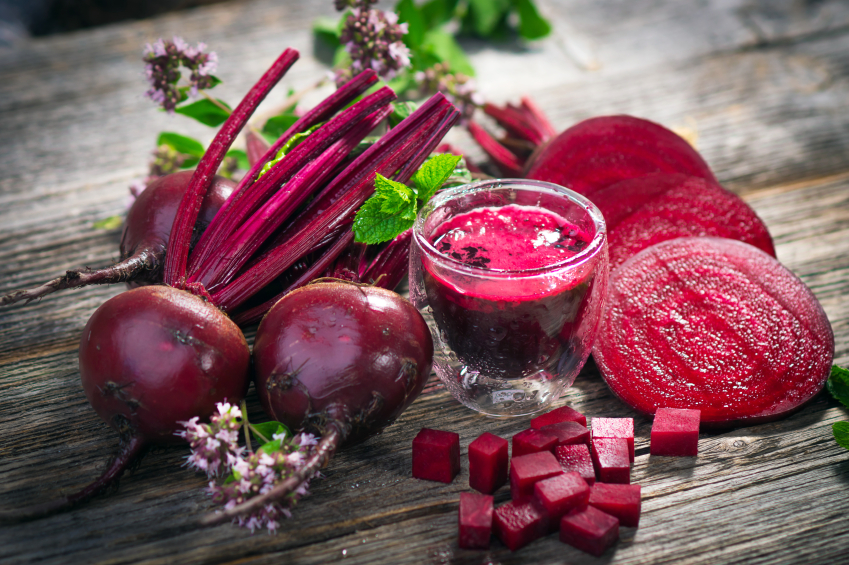
高原反应,来一杯甜菜汁吧
Beet Juice Could Help Body Beat Altitude
高原反应,来一杯甜菜汁吧
Beet juice contains nitrates , which the body can convert to nitric oxide, a chemical that relaxes blood vessels and makes it easier to function in conditions of low oxygen.
我们的身体能将甜菜汁中的硝酸盐转化成一氧化氮,松弛血管,使其适应低氧环境
撰文/播音 克里斯托弗·因塔利亚塔(Christopher Intagliata )
翻译 王娇娇
审校 杨一森
At 14,505 feet, Mount Whitney towers over California's Sierra Nevada range. It's the tallest peak in the lower 48—which means it attracts thousands of weekend warriors every year—or make that weakened warriors. You see them staggering along the narrow, rocky trail, huffing for air, dizzy and exhausted from the low oxygen levels at high elevation. And once they're sick?
海拔14505英尺的惠特尼峰静静地伫立在加利福尼亚州。在内华达山脉较低的48座山峰中,惠特尼峰是最高的一座,这意味着它每年吸引了成千上万的“周末战士”(weekend warriors)——不如说是“周末颤 士”(weakened warriors)。他们在海拔高、氧含量低的情况下,沿着狭窄崎岖的山道蹒跚而行。他们大口喘着粗气,头晕目眩、筋疲力尽——他们在途中生病了怎么办?
"The best medicine is to go down. That's actually the only cure that works." Svein Gaustad, a physiologist at the Norwegian University of Science and Technology. He says previous studies suggest blood vessels tend to contract at high altitudes, possibly because they need oxygen to relax—exactly what's in short supply on mountain tops. But there may be a dietary way to get more oxygen to your blood vessels: in the form of beet juice. The juice contains nitrate, which the body converts to nitric oxide, the compound that keeps arteries limber.
“再好的药也比不过下山休息——实际上这也是唯一有效的方式。”来自挪威大学科学与技术学院的生理学家斯韦恩?盖于斯塔(Svein Gaustad)说道。他提到,先前的研究表明在高海拔地区,血管容易收缩。其中一部分原因在于血管需要靠氧气才能松弛,而在高山上,氧气恰恰是供不应求的。但也许可以通过饮食来为血管补充点氧气:来点甜菜汁。甜菜汁里有硝酸盐,身体将其转化为一氧化氮,而一氧化氮则可以保持动脉的弹性。
Gaustad and his colleagues tested that theory during a trek in Nepal, at 12,000 feet. Eight volunteers alternately drank shots of regular beet juice, and another day, beet juice with the nitrates stripped out. A few hours later, the researchers measured blood flow and artery diameters with ultrasound. And they found that the regular beet juice did indeed restore blood vessels back to their low-elevation flexibility, whereas the nitrate-stripped juice did not. The results are in the journal Nitric Oxide. [Emily Bakker et al, Acute dietary nitrate supplementation improves arterial endothelial function at high altitude: A double-blinded randomized controlled crossover study]
盖于斯塔和他的同事征集了八个志愿者,在海拔12000英尺的尼泊尔进行长距离徒步。为了检测他的理论,被试们一天喝普通甜菜汁,一天喝去掉硝酸盐的甜菜汁。在喝完样品的几小时之后,研究者们用超声波测量了血液流量和动脉直径。他们发现普通甜菜汁确实将血管的柔韧性恢复到了低海拔时的水平,而去掉硝酸盐的甜菜汁却没有这个作用。相关结果已发表在Nitric Oxide杂志上。
Gaustad says better vascular function has the potential to deliver more blood—and therefore more oxygen—to tired muscles. But they still don't know if that translates to better performance at altitude. And, he says, beets won't hurt, but they're no substitute for proper acclimatization. "If I had a bottle of beets around I would take it for sure. But that won't bring you to Mount Everest just by drinking beetroot."
盖于斯塔说血管功能越好,运输血液的能力越强,因此能输送更多氧气来缓解肌肉疲劳。但是他们仍然不知道这是否意味着食用甜菜汁是否能在高海拔地区提高运动能力。他说,喝甜菜汁没什么坏处,但它们不能代替我们身体去适应高海拔气候。“如果我有一瓶甜菜汁,我会喝它,但只是喝喝甜菜汁可不能把你带到珠穆朗玛峰。”
未经书面许可任何人不得复制或镜像
京ICP备11000850号-1
 京公网安备11010502039775号
京公网安备11010502039775号 信息网络传播视听节目许可证0111611号
国家科技基础条件平台

















